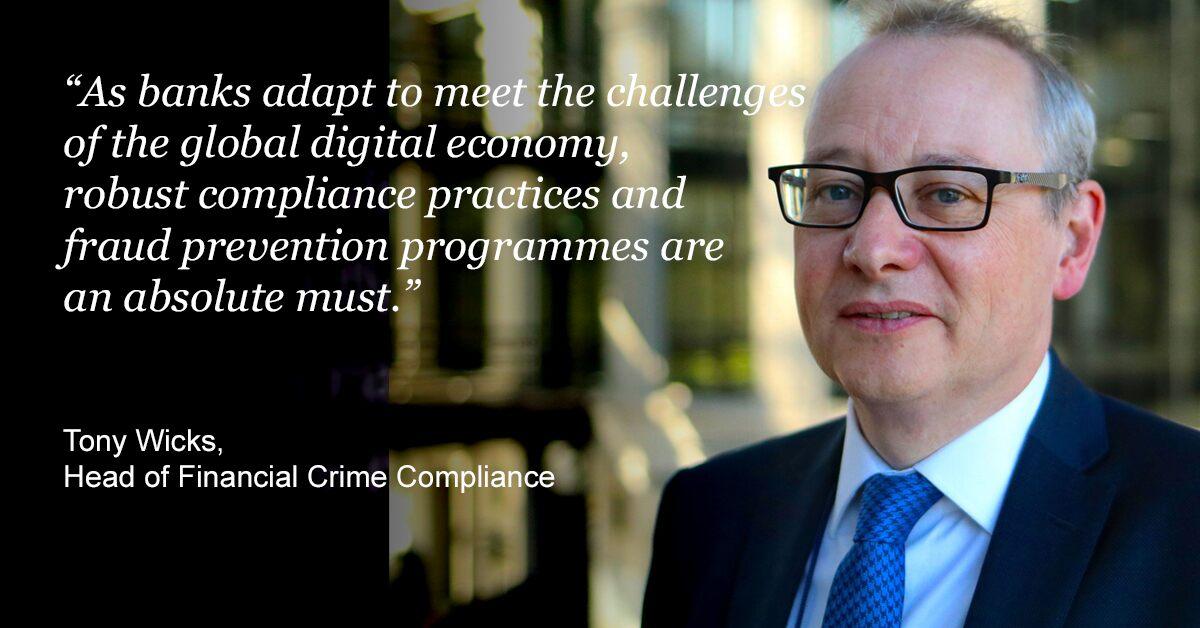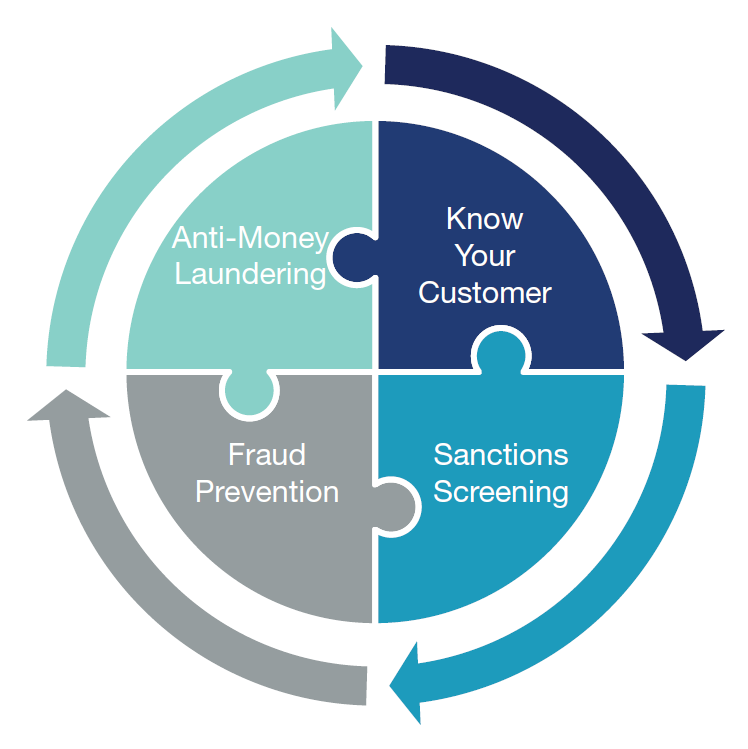Shaken up by waves of regulation and compliance requirements, financial crime obligations are more complex than ever. Swift has responded by developing a broad portfolio of sanctions, KYC, AML and fraud prevention solutions.
Financial institutions have been expected to comply with international sanctions and anti-money-laundering (AML) requirements for decades. And events over the past few years added counter-terrorist financing (CTF) to the mix, alongside the increasing threat of cyberattacks and fraud. The financial crisis sharpened regulatory focus on banks while trimming profit margins, and—as overall compliance costs shot up and margins shrank—there was a growing call for a more standards-driven, collaborative approach.
Taking stock
Shaken up by waves of regulation and compliance requirements, financial-crime obligations are now more complex than ever—and carry major cost and efficiency implications for correspondent-banking relationships. Chief executive officers see this as the greatest threat to business growth.
We are also seeing changes in the payments landscape, with major market-infrastructure overhauls, more sophisticated customer demands and new technology. And compliance teams are under increasing pressure to ensure their businesses remain competitive whilst staying compliant.
New challenges and opportunities
As we move towards compliance in a real-time world, AML, KYC (know your customer) and sanctions compliance will become even more challenging. Compliance and cybersecurity are becoming intrinsically linked, as cybercrime moves from individual-accounts fraud to institutional-payments fraud. High-quality data and analytics are also becoming an imperative for banks to improve efficiency and ensure greater transparency.
The need to future-proof compliance processes and respond appropriately to the risk of the evolving payments landscape more effectively are paramount for compliance professionals. And at the same time, they want to defuse the fraud threat and use new technologies to help their businesses thrive.

Swift’s evolving role in compliance
As an industry cooperative, Swift has responded assertively to market needs by developing a broad portfolio of sanctions, know your customer (KYC), AML (transaction monitoring and analysis) and fraud-prevention solutions. And it’s not stopping there. By leveraging industry-defined standards, a common infrastructure and shared costs, and by collaborating closely with our customers, we are expanding our solutions portfolio to help members address evolving regulatory requirements, while increasing the effectiveness and efficiency of their compliance programmes.
With more than 40 years of experience enabling the banking community to exchange secure, standardised financial messages, Swift is uniquely positioned to provide financial-crime compliance teams with relevant, simple-to-use and hosted solutions. This allows banks to remain agile, keep systems and processes up to date, and be prepared for regulatory scrutiny.
A robust portfolio
In 2012, we launched two sanctions-compliance services, offering value to different financial institutions, from very small to very large. More than 900 institutions now trust Sanctions Screening for simple, cost-effective transaction screening.
At the same time, when testing and validating our own filter, we realised that larger institutions needed tools to test their own filters, so we developed and launched Sanctions Testing. This provides the world’s largest financial institutions with the assurance that their installed screening solutions are functioning effectively and deliver major efficiency gains. We also expanded Sanctions Screening to deal with larger transaction volumes and both on-Swift and off-Swift transactions. And this paved the way for Name Screening, which provides fast, accurate screening of single names via online lookup and entire databases for up to 50 million records hosted entirely on the Swift cloud.
As our sanctions solutions gained traction, we started to tackle data analytics and KYC compliance. Swift data is standardised, global and contains unique insights. Unlocking its richness helps banks target their compliance activities to reduce cost and risk. One hundred leading banks, representing over half of all Swift message traffic, now use Compliance Analytics to leverage their Swift data for more effective sanctions, KYC, AML and counter-terrorist financing (CTF) programmes. Recently, we launched Correspondent Monitoring, a new module to meet regulatory requirements for the detection of money laundering.
While transaction data is critical to sanctions and AML compliance, customer data plays a vital role in customer due diligence and KYC compliance. More than 7,000 Swift members engage in correspondent-banking activities, and these institutions have more than 1.3 million mutual relationships. Here was a natural opportunity for us to use our 40+ years of expertise in security, standards and collaboration to help save our members money. In late 2014, we launched The KYC Registry—a secure online platform for banks to store their KYC information and exchange it with their counterparties.
Currently, more than 5,100 banks, representing more than 80 percent of Swift traffic, use The KYC Registry, which helps users better manage risk and reduce the cost and effort related to correspondent due-diligence compliance. And as The KYC Registry extends to other areas this year, the number of users is set to rise significantly.
While we were delivering sanctions, KYC and analytics solutions, another challenge reared its head: cybercrime. In response to high-profile back-office hacking incidents, we have enhanced our already robust security provisions and helped our members do the same. At the end of last year, we launched Payment Controls, a new solution for fraud prevention and detection, which is an integral part of our Customer Security Programme. Payment Controls helps customers to monitor and protect their core payments, by flagging and responding to fast-moving, suspect transactions efficiently. In the event of an attack, banks require separate controls to check and stop payments, and this in-network solution provides just that. This is a significant development and a major source of defence for customers.

Looking ahead
As banks adapt to meet the challenges of the global digital economy, the need for robust compliance practices and fraud-prevention programmes is more important than ever. Our proven solutions, developed in close collaboration with our customers, address industry-wide challenges.
Swift is transforming cross-border payments with Swift GPI and helping correspondent banks to accelerate and streamline every aspect of their businesses, including compliance. Increasing the speed and volume of payments generates new financial-crime threats—and we believe these shared, non-competitive challengesare best addressed through common, shared approaches.
Implementing our instant-on, hosted (cloud) utility solutions reduces information-technology (IT) costs, speeds solution deployment and reduces reliance on time-consuming, inefficient and potentially risky manual processes, while also lowering costs and achieving world-class security. Our solutions also allow businesses to standardise compliance processes without installing expensive hardware or software and enable them to use global Swift data to gain unique insights and better targeted compliance activities.
Are we hitting the mark? The figures speak for themselves. In 2018, more than 950 new customers joined the Swift community of financial-crime compliance users, and Swift is now serving more than 6,400 customers globally.
We are still growing strong, and looking forward to working with our community to enable financial institutions to continue doing business safely, securely and effectively.
Article first published in International Banker on 19 March 2019.


